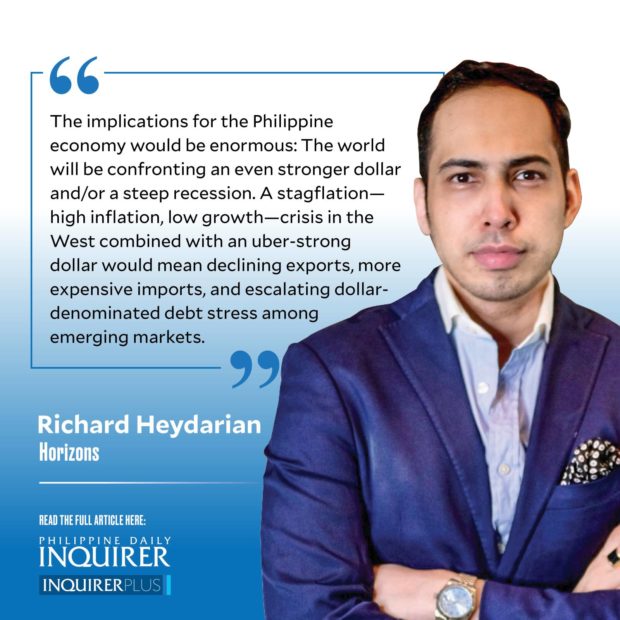Time for economic revolution under Marcos Jr.
Last week, presidential son, Ferdinand Alexander “Sandro” Marcos III, stirred a tempest in a teapot after an interview on the unprecedented state of Philippine peso. “The peso is not weak, because the peso is weak. The peso is weak because the dollar is strong,” said the neophyte congressman. What was likely concocted as a clever turn of phrase inadvertently unleashed a torrent of memes and mockery online.
But in fairness to the presidential son, no less than Bangko Sentral ng Pilipinas governor Felipe Medalla said almost exactly the same thing earlier this year: “This is a strong dollar problem, not a weak peso problem.” Unlike the presidential son, however, the country’s monetary chief rightly emphasized the chief factor behind the decades-high increase in US dollar’s global standing: “The reason the dollar is so strong is their inflation rate is so high and, as a result, they will jump up their interest rates much more than we will…”
It didn’t take long for the country’s leading businessman, former senator Manny Villar, to also chip in, rightly arguing in a column, “the recent depreciation of the peso against the US dollar … was triggered by the interest rate hikes by the US Federal Reserve.” With September inflation numbers in the US (as in the Philippines) defying even the worst expectations of median experts, the US Federal Reserve is expected to gun for another earth-shaking rate hike in the coming weeks. The next Federal Open Market Committee meeting will be on Oct. 31 to Nov. 1. Another jumbo rate hike of 75 basis point, if not more, which still leave room for another hike by early next year, could push down the Philippine peso into new territories.
Perhaps, Rep. Joey Salceda’s P65-P68 to dollar exchange projection isn’t too farfetched; I suspect, though, the actual number would end up significantly lower, since markets were already warned about Federal Reserve’s leaning toward a 4.4 percent rate (from 3-3.25 percent currently) by the end of this year. The implications for the Philippine economy would be enormous: The world will be confronting an even stronger dollar and/or a steep recession. A stagflation—high inflation, low growth—crisis in the West combined with an uber-strong dollar would mean declining exports, more expensive imports, and escalating dollar-denominated debt stress among emerging markets.
Parallel to the hullabaloo over Sandro’s hot take, however, was a more intellectually subtle yet spirited debate between two young thinkers, the historian Lisandro Claudio (University of California, Berkley) and economist Jan Carlo Punongbayan (University of the Philippines, Diliman), on central banking and monetary policy. It goes without saying that the debate had its more unfortunate turns, especially when I foolishly took on the matter over Twitter, where a cabal of economist friends (and their proxies) was seemingly adamant on shutting down any debate on monetary policy (by noneconomists).
And in the trigger-happy universe of social media, where echo-chamber posturing often trumps substantive parsimony, some regrettable kerfuffle inadvertently ensued. But since this was a fundamentally “policy” issue, I, similar to Claudio, have insisted that it’s not something to be left to economists alone. Let’s be crystal clear: economics is not a natural science, but instead an admirable social scientific field that deals with complex human societies, where moral agency is inevitably part of the equation.
Thus, I commend both Claudio and Punongbayan, who also happen to be my friends, for their passionate interventions on behalf of substantive public policy discussions. And, dear reader, this brings us to the real economic challenge under President Marcos Jr.: The need for a fundamental reassessment of not only our monetary policy, which has its inherent limitations, but also our trade and industrial policy, which have a direct bearing on our export capacity and overall economic productivity.
As former National Economic and Development Authority chief Solita Monsod has correctly pointed out, “The peso is weaker because … we have been having trade deficits … our imports have grown so fast and our exports are not growing at all.” If Mr. Marcos really wants to leave behind a transformational legacy, and make the Philippines a true “tiger economy,” he will have to overhaul our national economic strategy. It’s a revolution whose time has arrived.
rheydarian@inquirer.com.ph

















